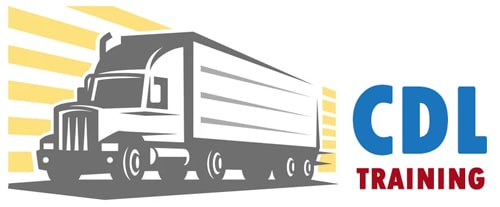The Road To A Successful OTR Trucking Career
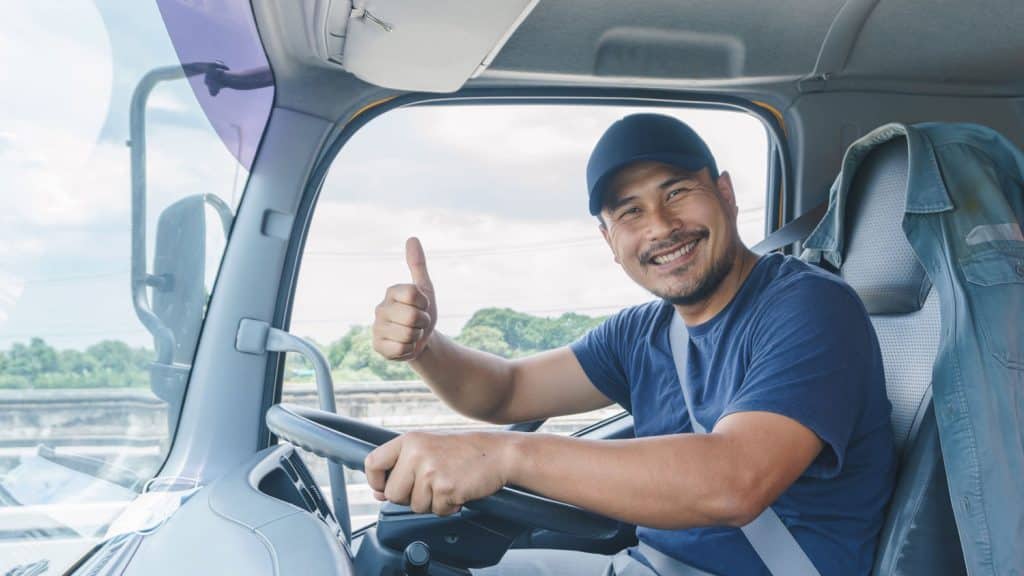
Starts with Free CDL Practice Tests
If you are interested in pursuing a career in the trucking industry, it may be one of the wisest choices you could make. OTR trucking jobs are in high demand and will likely remain this way for the foreseeable future. There are several factors, however, that will determine if you will be successful in this industry. We are going to take a balanced look at each step in the process, so you can decide for yourself if this will be a good career move for you.
We will also provide a free CDL practice test to help prepare you to pass your commercial driver’s license.
CDL schools are divided into three general camps:
- Vocational CDL Schools: mostly available through community colleges or vocational training institutions.
- Private CDL Schools: stand-alone entities that don’t own or use trucks but offer thorough education about the subject matter.
- Company-Sponsored CDL Programs: offered by a trucking company for the purpose of getting you prepared for a job with that company.
Each of these paths offer their own set of advantages, disadvantages, and most importantly from where you’re sitting, their own little known behind-the-scenes issues that will make your life harder if you are not prepared.
Vocational CDL Schools
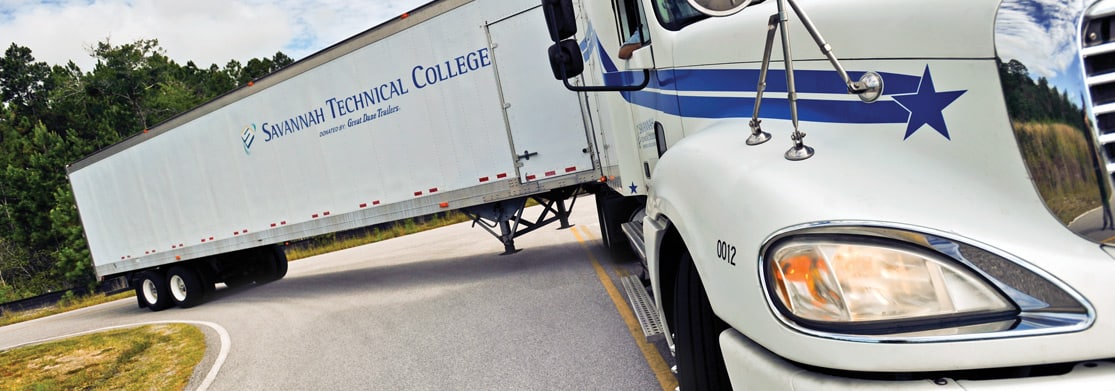
The Good
- A vocational school will put you in a position to get your license without obligation; meaning you can go anywhere, approach any company, and be generally qualified.
- Vocational schools are meaningfully less expensive than private schools, and if you apply for grants, loans, or scholarships, you can defer or reduce that cost even further.
- You can get a CDL as part of a larger education, or you may choose to take just a couple of other classes that are equally interesting and/or offer other potential career paths.
The Bad
- Vocational training is the slowest way to obtain a CDL, often taking months longer than a private school or company program.
- You have to qualify for a community college; it is possible to get denied, and if you do, you will have to wait another quarter or semester to apply again.
The Ugly
- Time for the First Ugly Truth of the trucking industry; many, if not most, trucking companies’ insurers require them to hire truckers with at least a year of experience on the road. That makes landing a job fresh out of class significantly harder than anyone will tell you, and while the school’s placement counselor has some ability to help, it is far from guaranteed they will be able to find you work. In other words, vocational truck driving school is actually the most difficult to get hired out of.
Private CDL Programs
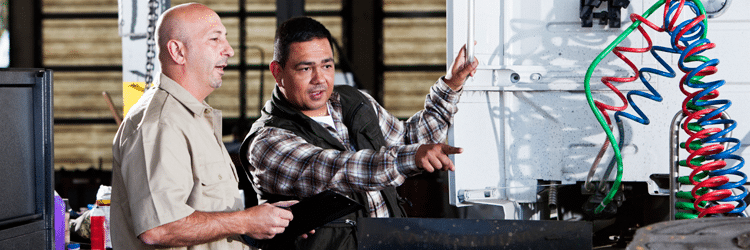
The Good
- Private schools offer, in general, the best all-around training in commercial driving. Getting a CDL from a good private school (see Ugly, below) is kind of like getting a Master’s Degree in commercial driving.
- Many private schools can work with you around your schedule, making it easier to hold down a job and attend than the other options.
- Private schools offer the fastest route to obtaining a commercial trucking license, period. Yes, even faster than company-sponsored CDL programs.
The Bad
- Exactly what you might expect; private schools are expensive. Compared to community college, even without financial aid, you can expect to spend 30-50% more for privately-obtained CDL training.
- Private CDL teaching quality varies significantly more than vocational schools; you’re taking a gamble on getting a teacher that is still interested and interesting, rather than one who is not all that interested in your trucking career once you’ve paid your tuition.
- Finally, the same warning that applies to vocational/community college applies here; some private schools have agreements with specific companies for job placement, but that varies from school to school, and it’s never guaranteed.
The Ugly
- Standards are…less than rigorous for this kind of school, so it is possible to stumble upon a private school that is below the standards you should expect. These schools often do not last long, but do a little research before you sign up for private school and make sure they have been around a while and have decent reviews. The best thing you can look for is a school that has been accredited by the Department of Education, certified by the Professional Truck Driver’s Institute, or better yet both. If you find one that is neither, it does not necessarily mean it’s a bad school, but finding one that has credible certifications and accreditations behind it gives you far more assurance about the level of quality you are getting.
Company-Sponsored CDL Programs

The Good
- A company-sponsored CDL program guarantees you will be able to put your skills to work after you finish your class.
- Company-sponsored CDL training is almost always free (but see Ugly below).
- You won’t be put out on your own at first; you’ll be a ‘co-driver’ for a few-to-several weeks after the end of your class, so you can get some practical OTR (over-the-road) education in addition to the formal side.
The Bad
- If you don’t work for the company that paid for your school for at least a year (up to five in some contracts), you’ll owe them retroactively for a portion of your training. So in a sense, you cannot call this completely free CDL training since you’re locked into that company for a set period of time.
- Different companies expect different specific skills, and sometimes you don’t learn until years later that a company-sponsored CDL training program skimmed over something your new employer considers both critical and common knowledge.
The Ugly
- Here we get to the Second Ugly Truth of the trucking industry: truckers are largely considered dispensable, replaceable, and unimportant by the companies that manage the routes and maintain the trucks. In the case of a company-sponsored CDL program, that can crop up more-or-less immediately, in the form of “hey, remember that job we said you’d get? Yeah, well, we trained too many drivers and you’re on hold for the next nine weeks until we need you.” Another potential scenario is you could end up being moved to Biloxi to take a route that will have you driving from there to Calgary and back every other week until a route opens up closer to home.
Being a trucker has a lot of advantages; freedom, travel, independence, and a good wage are all real benefits of being an OTR trucker.
But the disadvantages are real, too, and it is helpful to have a balanced, well-informed perspective. When it comes to job security, there is job security as a trucker, but it’s not because any one company will treat you well and loyally — it’s because there are companies who need big rig truckers everywhere.
The built in job security once you have a firm foothold in the industry is perhaps the biggest advantage, especially in today’s uncertain economy, and the free CDL practice tests later on this page will give you a good idea of what it will take to successfully obtain your commercial driver’s license and get started in this lucrative career.
How to Be a Good Trucker: The Mindset
Before you hit the road, you should have a good mental grasp of what it takes to be a good trucker. The number one factor that separates a good trucker from a poor one is professionalism, which is comprised of one part proactivity and several parts patience.
Proactivity means constantly thinking forward, both in the big picture and in the immediate sense, and taking actions that will guide the current situation toward the best possible outcome.
For example, if you have a long trip ahead of you, leave a day early so you can afford to have a minor disaster without being late with your load.
If you’re driving in even modestly dense traffic, think about what the other drivers are likely to do before you decide how to navigate your twelve-ton death machine on wheels across two lanes of traffic in one go. Whatever situation you’re in, analyze and plan — that’s how you get better results than the guy driving by the seat of his pants.
- Patience means being able to maintain a positive perspective when those plans you’ve made go awry. This happens almost daily, and being able to deal with ever-changing plans without getting angry (and without giving up on being proactive!) is the single most important mental attribute of a good trucker. Idiots on the road will pass you at 80 mph and then slow down to 54 in a 60 zone. Idiots in your home office will reroute you while you’re halfway from Seattle to Vancouver, B.C. and tell you your pickup was accidentally dropped off in Spokane and “can you please drive an extra nine hours today to go pick it up? Okay thanks, bye.”
We’ll cover some specific tips a bit later, but for now, start practicing today; get in the habit of looking at your situation and asking yourself “how do I set myself up for future success?” And get in the habit of smiling in the face of the most annoying thing you deal with, and acting like it’s no big deal and you’ve got the skills to make it all better. You may also wish to get started right away on any of our free CDL practice tests at the bottom of this page to assess your current skill level.
Getting a Truck Driving Job with No Experience
Worst-case scenario; after extensive preparation and several CDL practice tests you’ve just passed your CDL, but there’s no one who seems interested in hiring you, and the placement program wherever you went came up “sorry!” What do you do next? Here are some options:
Get a Related Job
One of the options that’s rarely discussed is getting a not-quite-trucking job that will nevertheless give you experience driving big trucks. Look for jobs as a ‘yard goat’ or ‘yard hostler’ (driving equipment around inside of a large yard, such as a rental facility or a large truck repair outfit), as a ‘warehouse driver’ (same basic idea, just don’t get stuck eternally on the forklift or you won’t be able to say your experience is directly relevant), or if you live in the right areas, there are dozens of trucking jobs in the oil industry — particularly on fracking sites — that will put anyone that has passed their CDL to work shipping wastewater to remote destinations and returning to the site.
Be Willing to Be Uncomfortable
Here’s the Third Ugly Truth about the trucking industry; there are always trucking positions open for someone with a CDL who is willing to do the uncomfortable jobs — the ones that are 13 days away, 1 day home, or involve having to back down a three-mile-long winding mountain road multiple times daily (this actually happens), or expect you to drive for 27 hours at once then sleep for three days, etc. If you’re at a point in your life where you don’t need to hold down a stable residence or have a significant other, it’s not hard to get a year’s experience. And once you’ve proven yourself patient and proactive (and kept a clean driving record), you’ll never lack employment again.
Do Exactly What Everyone Else Does
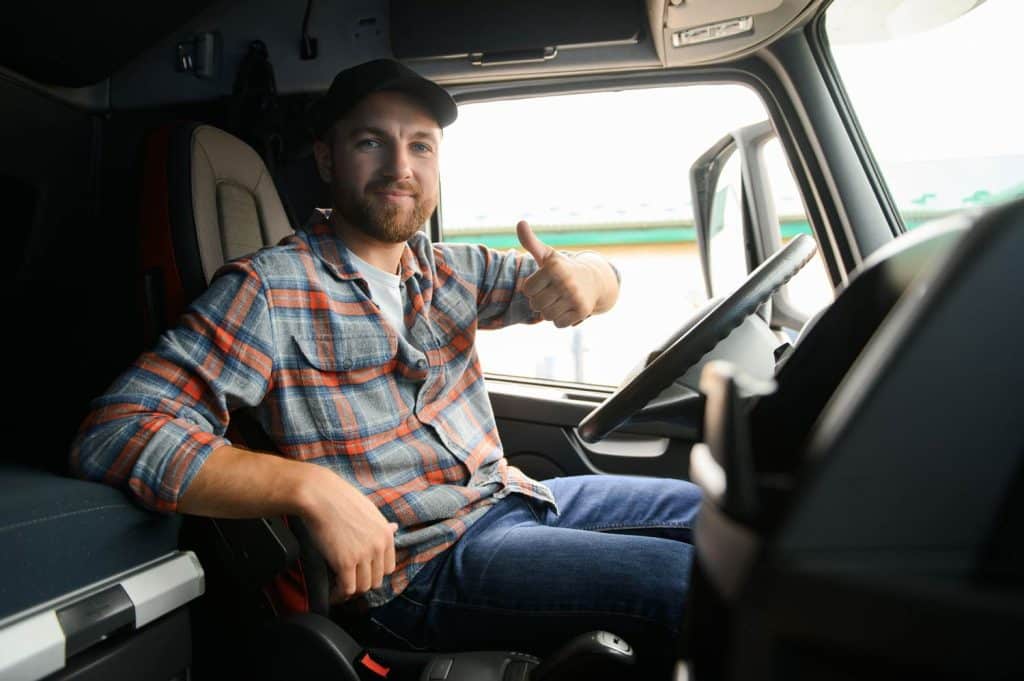
Which is to say – job hunt like you’re on unemployment.
Walk into every business in your city that has a truck sitting outside, and hand them your resume.
Network with people in positions that matter and do this both online and offline.
Put legitimate effort into every application and every interview.
Convince the owner of some small, local trucking company you’re worth hiring even though he’s going to have to pay extra for your insurance the first year.
Treat job-hunting like it’s your full-time job, and leave no stone unturned.
Your First Day Out
When you do finally complete your CDL training and land that first trucking job, you’ll communicate with dispatch, who will tell you where you’re going, when you need to be there, what to pick up, where to take it, when you need to be there, and any special details you’ll need. This is widely recognized as one of the ‘make or break’ moments, because if you can’t deal with your dispatch person (who statistically is probably not easy to get along with), you will have difficulty making it as a trucker.
This is where the patience part comes in.
Be patient, get all the information, ask all your questions, and don’t set off until you have a clear enough picture in your head of where you are going and what your assignment is.
Why Patience Is So Important
Time for the Fourth Ugly Truth; unless you hired on with a small-time, local company that knows your family and has half a reason to treat you well, you will get saddled with a highly undesirable job several times in your first six months. Trucking companies know exactly what makes a job crappy; sometimes the client is awful, sometimes the pick-up or drop-off are in undesirable locations, sometimes it’s a HAZMAT load and requires special care, sometimes the load is so heavy you can’t drive on most roads — and they deliberately give those jobs to people too inexperienced to know they should decline.
A good truck driver doesn’t see this as a problem; (s)he sees it as an opportunity. If you can get a seventeen-ton load of nuclear waste from the heart of downtown Detroit’s murder district to the 140-degree wasteland of Death Valley in less than 24 hours and come out the other end with a smile and a thank you despite being yelled at by a sweaty obese man that smells of rotting poppadoms, well, you’re a mother-trucking badass, and nothing in the industry will faze you. Think of it as an opportunity to beat the system — then learn exactly what part of these jobs is something you don’t care to repeat, and never take a job like that again.
Your first day out has a significant chance of being one of these ‘test the new guy’ jobs, so be proactive and mentally gear up for it ahead of time. If you go in knowing it’s going to be a test, you’ll go in ready to work hard and pass. If you go in thinking ‘I’m the new guy, they’ll start me off with something easy,’ you’ll get curb-stomped and want to quit. Bring the right mindset with you.
Ready to take a free CDL practice test? Click here to start your journey into the trucking industry.
Tips for Making the Trucker Life Easier
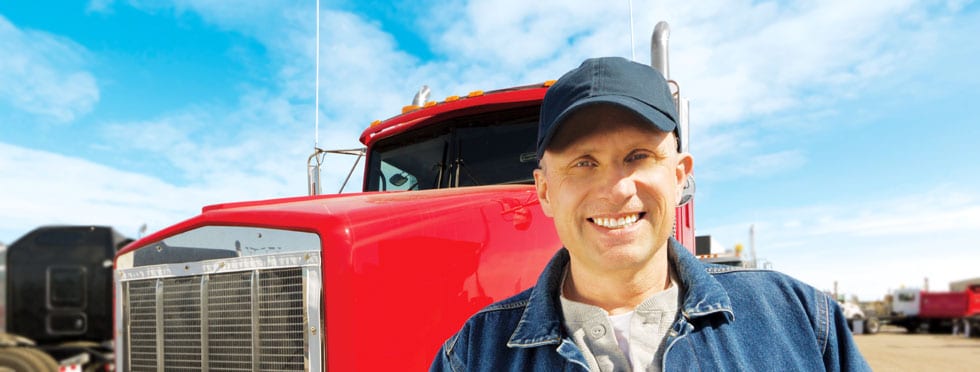
So, you’ve survived your first job and you’re ready to make trucking the lifestyle of choice for your foreseeable future. Congratulations! Welcome to a life of freedom, travel, some of the best people you’ll ever meet, and some of the most beautiful sights in the world. Here are some tips and tricks that you’ll probably figure out on your own eventually — but why not pick them up here and now?
The Things You Need For Life on the Road
- Grab a big plastic tub and turn it into your bathroom. Pack up everything you need to do your morning and evening toilettes, including showers. Soap, razor, shaving cream, any medicines you take, deodorant, foot powder, disinfectant spray (you’ll want it for some toilets and even some showers), flip-flops (again, to wear in some showers), toothbrush, toothpaste, and so on.
- Get another tub and turn it into your kitchen. Get a mess kit, pack-up silverware, some small but passable kitchen knives with sheaths, dish soap, rags and towels, and a few of your favorite spice mixes. Everything except the heat source should fit into a medium-sized tub if you do it right.
- A third tub becomes your emergency kit. First aid supplies, duct tape, electricians tape, a typical in-car toolkit, a spare vise grip (always find uses for those!), a few pairs of gloves, and a spare of each of the kinds of lights on your truck in case one goes out in the middle of nowhere.
- Electronics! You’re going to want, at the minimum, a device capable of taking video and sound recordings; sound so that you can record the details of your assignment, video so that you can record things like the hole the client left in one of their own crates when they loaded it onto your truck or the dent in the back end of your truck that some other guy left when he backed into you and drove off. There are lots of clients and some companies that are unwilling to believe you unless you have proof. So have proof; record absolutely everything that might be relevant later.
- Also, a laptop, preferably with a satellite Internet card. You’re going to have a lot of free time here and there, and it helps to have something to do (just look at how active many CDL trucking forums there are, and you’ll see how commonplace this is). Also, it’s useful to have the ability to get a different map, set of directions, or other information about where you’re going. Google Street View has saved many a trucker’s job and probably a few lives as well, no joke.
Truck Stop Secrets
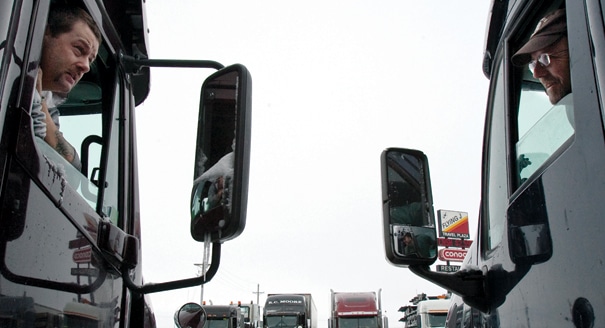
- You’ve been sitting for a long time, and you can use the walk — so skip all the hassle of looking for a parking space up close and just head to the far end of the lot. Park next to the curb so only half your truck is vulnerable to some doofus clipping you on their way past, and enjoy the stroll.
- Don’t buy anything at the truck stop unless you have to; there’s almost always a discount store within a few miles. If you’re proactive, you can plan a way to get to the other spot, buy what you need on the cheap, and get back efficiently.
- If you eat at a truck stop buffet, take your food from the back of the pan (or the very middle if it’s accessible from both sides.) Not to disrespect anyone, but a lot of truckers are really bad at washing their hands. Also, unless you have time to sleep, don’t overeat — it slows your reflexes by diverting blood from your brain to your stomach.
- When you start your day, proactively plan out what you’re going to need that evening and whip out your laptop and search for a truck stop that meets your needs. You can find some that offer a laundromat, some that offer video games, and even some that offer haircuts…but almost none that offer everything. Figure out how to get what you need for that day, and you’ll save yourself a lot of hassle.
Taking your CDL Test
Passing the CDL driving test is an essential hurdle to clear in becoming a truck driver. The best way to prepare is to take several CDL practice tests ahead of time.
In each of your practice tests, take note of the questions you get wrong and look up the correct answers in your CDL study guide or in a credible online course.
This is the best way to address your weak spots and enter the real thing as well prepared as possible.
Feel free to take any of our free CDL practice tests as often as needed so you can be successful when you have to do it for real. Good luck!
